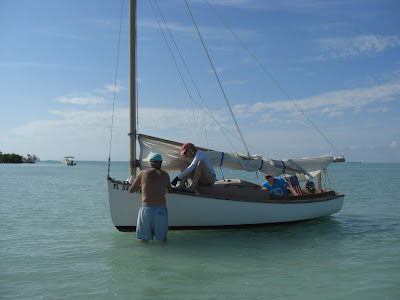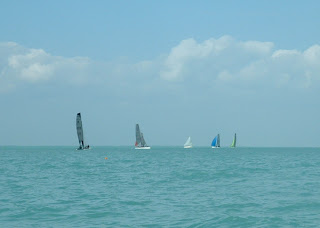 Wind piping up from the SSW kept me from venturing out into the back country. Took a ride to Worldwide with Wayne and Tony, where I spent more money on fishing gear. It looks like Monday might be the next day for a try at fishing and perhaps a sail. Meanwhile, there is more snow in NJ and more to come, no, I do not miss the white stuff! Blue water trumps cold and snow any day.
Wind piping up from the SSW kept me from venturing out into the back country. Took a ride to Worldwide with Wayne and Tony, where I spent more money on fishing gear. It looks like Monday might be the next day for a try at fishing and perhaps a sail. Meanwhile, there is more snow in NJ and more to come, no, I do not miss the white stuff! Blue water trumps cold and snow any day.
Saturday, January 22, 2011
Slow Day in the Keys, More Snow In The North
 Wind piping up from the SSW kept me from venturing out into the back country. Took a ride to Worldwide with Wayne and Tony, where I spent more money on fishing gear. It looks like Monday might be the next day for a try at fishing and perhaps a sail. Meanwhile, there is more snow in NJ and more to come, no, I do not miss the white stuff! Blue water trumps cold and snow any day.
Wind piping up from the SSW kept me from venturing out into the back country. Took a ride to Worldwide with Wayne and Tony, where I spent more money on fishing gear. It looks like Monday might be the next day for a try at fishing and perhaps a sail. Meanwhile, there is more snow in NJ and more to come, no, I do not miss the white stuff! Blue water trumps cold and snow any day.
Thursday, January 20, 2011
Homeward Bound
Rick and Mary just purchased this boat last year, this was one of their longest outings to date!
With one reef in, Rick and Mary are sailing along comfortably
Roland experiencing some of the unusually heavy fog that has hit our area during the last couple of days.
More like what Roland is used to in Maine, aye ut!
 |
| Rick Beeman and his wife, Mary Cahill sailing home |
 |
| Sea Bean with her skipper and mate |
 |
| Fog setting in |
 |
| Some unusually heavy fog for the Fl. Keys, Rolands perspective! |
More Pictures from our Nest Key Sail courtesy of Roland Barth
Here are some more pictures of our little flotilla at Nest Key. These picture are sent to me by Roland Barth aboard Ibis. We all had a great sail and enjoyed the sharing of ideas and experiences on Nest Key.
 |
| A-Lee with Charlie and Salee Lawrence aboard |
 |
| Very nice shot of four Cat Boats anchored off Nest Key in the Everglades Nat'l Park |
 |
| Left to right- Rick Beeman, Mary Cahill, Charlie and Salee Lawrence and me aboard Lee Marie |
 |
| I have already left to sail back to Hammer Point, L to R Sea Bean, A-Lee and Ibis |
Wednesday, January 19, 2011
Winds SW around 5 Kts. SO NOT TRUE NOAA!
 |
| Just waiting for the winds to subside, they never did |
THIS IS A CATBOAT!
Catboat
The occupied boats are catboats, but with a mast and boom rigA catboat (alternate spelling: cat boat), or a cat-rigged sailboat, is a sailing vessel characterized by a single mast carried well forward (i.e., near the front of the boat).Although any boat with a single sail and a mast carried well forward is 'technically' a catboat, the traditional catboat has a wide beam approximately half the length of the boat, a centerboard, and a single gaff-rigged sail. Some catboats such as the Barnegat Bay type and more modern catboat designs carry a Bermuda sail. A jib is sometimes added, but this may require a bowsprit, and technically creates a sloop sail-plan.
It is generally accepted that the origin of the catboat type was in New York around 1840 and from there spread east and south as the virtues of the type — simplicity, ease of handling, shallow draft, large capacity — were discovered.
Historically, catboats were used for fishing and transport in the coastal waters around Cape Cod, Narragansett Bay, New York and New Jersey. Some were fitted with bowsprits for swordfishing and others were used as 'party boats' with canvas-sided, wood-framed summer cabins that could be rolled up.
Around the turn of the 19th century, catboats were adapted for racing, and long booms and gaffs, bowsprits and large jibs were fitted to capture as much wind as possible. The decline of racing and advent of small, efficient gasoline engines eliminated the need for large sailplans, and catboats today are used as pleasure craft for day sailing and cruising, and have the virtues of roominess, stability and simple handling, though many catboats have poorer upwind performance than well-designed sloop-rigged craft.
The Breck Marshall is a 20-foot (6.1 m) Crosby catboat design that is open for public use at Mystic SeaportOne of the most well-known catboats is the 12-foot (3.7 m) Beetle Cat daysailer. Fleets of these one-design boats are found in harbors all across New England, often competing in races. In the 1960's, Breck Marshall based his 18-foot (5.5 m) fiberglass Sanderling upon an existing, wooden design. The Sanderling has since become a very popular boat, with more than 700 built, and it has helped to rekindle interest in the catboat. To honor Marshall and his contribution to the type, the Catboat Association funded the construction of the Breck Marshall, a 20-foot (6.1 m) catboat built and berthed at Mystic Seaport.
The terms catboat and cat-rigged are often confused with catamaran. Catamaran describes the hull structure of a boat (specifically, it refers to two hulls side-by-side) whereas cat-rigged and catboat describe the sail plan and vessel type, respectively. To add to the confusion, some small sporting catamarans are cat-rigged and both terms are abbreviated cat when no ambiguity is foreseen. A catboat was used in colonial times.
 |
| LEE MARIE Circa: 1970 |
The occupied boats are catboats, but with a mast and boom rigA catboat (alternate spelling: cat boat), or a cat-rigged sailboat, is a sailing vessel characterized by a single mast carried well forward (i.e., near the front of the boat).Although any boat with a single sail and a mast carried well forward is 'technically' a catboat, the traditional catboat has a wide beam approximately half the length of the boat, a centerboard, and a single gaff-rigged sail. Some catboats such as the Barnegat Bay type and more modern catboat designs carry a Bermuda sail. A jib is sometimes added, but this may require a bowsprit, and technically creates a sloop sail-plan.
It is generally accepted that the origin of the catboat type was in New York around 1840 and from there spread east and south as the virtues of the type — simplicity, ease of handling, shallow draft, large capacity — were discovered.
Historically, catboats were used for fishing and transport in the coastal waters around Cape Cod, Narragansett Bay, New York and New Jersey. Some were fitted with bowsprits for swordfishing and others were used as 'party boats' with canvas-sided, wood-framed summer cabins that could be rolled up.
Around the turn of the 19th century, catboats were adapted for racing, and long booms and gaffs, bowsprits and large jibs were fitted to capture as much wind as possible. The decline of racing and advent of small, efficient gasoline engines eliminated the need for large sailplans, and catboats today are used as pleasure craft for day sailing and cruising, and have the virtues of roominess, stability and simple handling, though many catboats have poorer upwind performance than well-designed sloop-rigged craft.
The Breck Marshall is a 20-foot (6.1 m) Crosby catboat design that is open for public use at Mystic SeaportOne of the most well-known catboats is the 12-foot (3.7 m) Beetle Cat daysailer. Fleets of these one-design boats are found in harbors all across New England, often competing in races. In the 1960's, Breck Marshall based his 18-foot (5.5 m) fiberglass Sanderling upon an existing, wooden design. The Sanderling has since become a very popular boat, with more than 700 built, and it has helped to rekindle interest in the catboat. To honor Marshall and his contribution to the type, the Catboat Association funded the construction of the Breck Marshall, a 20-foot (6.1 m) catboat built and berthed at Mystic Seaport.
The terms catboat and cat-rigged are often confused with catamaran. Catamaran describes the hull structure of a boat (specifically, it refers to two hulls side-by-side) whereas cat-rigged and catboat describe the sail plan and vessel type, respectively. To add to the confusion, some small sporting catamarans are cat-rigged and both terms are abbreviated cat when no ambiguity is foreseen. A catboat was used in colonial times.
Welcoming the fourth Cat
Sea Bean : Drift seed, a seed of any of a number of tropical plants growing in coastal areas, the seeds of which are found floating upon ocean currents, by means of which the seeds are dispersed.
 |
| A fourth Cat joins us, Rick Beeman and his wife Mary Cahill aboard their Sandpiper Sea Bean. Sea Bean may refer to: |
 |
| Charlie and Salee Lawrence greet Rick Beeman and his wife Mary Cahill. |
 |
| Ahoy Sea Bean |
Nest Key
 |
| Arriving at Nest Key I was met by a solo Kayaker |
 |
| Roland Barth and his Cat Ibis |
 |
| These boats have a draft of only 18 inches which allows us to nearly beach them |
 |
| After his grand entrance, Roland sets about to furl his sail |
 |
| A-Lee chooses to lower sail then motor to the anchorage |
 |
| Three Cats from three different states. A-Lee in the foreground hails from Vermont, Lee Marie, in the middle is from New Jersey and the farthest Cat, Ibis is registered in Maine. |
The Usual Suspects!
Nest Key Rendezvous
 |
| Roland, his normal greeting, isn't quite ready to sail. Thank God for well placed shrub.(Note: I did not say bush) |
Monday, January 17, 2011
End of a great (and challenging) day on the water.
Sunday, January 16, 2011
Made a new friend yesterday!
 |
| My Host Skip |
Saturday, January 15, 2011
Catamarans on the Bay
Friday, January 14, 2011
COWPENS, a momentary haven!
As mentioned in the previous post, this is Cowpens, a cut that connects Key Largo to Islamorada. Roland stopped on the way home to put in a much needed second reef. Note: Historically, Cowpens got it's name from the fact that this cut was used to trap Manatees for slaughter, by the Railroad men during the settling of the Keys. The Manatees, used as a food source, were easy to capture as they are slow and very docile.
CATAMARAN North American Championships
 |
| Catamaran North American Championships |
 |
| A hard pill to swallow |
 |
| Sailing outside the race course |
 |
| Lee Marie among cats of another kind |
 |
| Heading home |
Subscribe to:
Comments (Atom)








